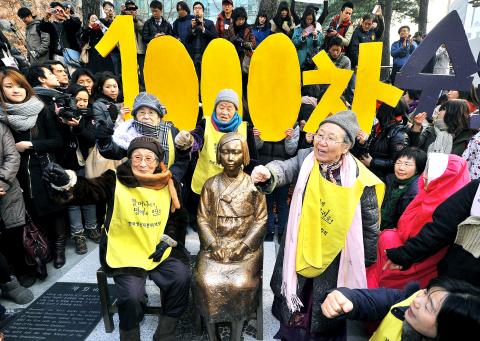South Korean women forced into wartime sexual slavery held their 1,000th weekly protest outside Japan’s embassy yesterday, demanding compensation and an apology from Tokyo as they have since 1992.
“Apologize!” shouted five women in their 80s or 90s and an estimated 500 supporters, waving banners reading “Compensate” and “Admit the war crime.”
Demonstrators campaigning to publicize World War II crimes braved near-freezing temperatures to unveil a “peace monument” across the street from the mission, despite protests from the Japanese government over the statue.

Photo: AFP
The five former sex slaves known euphemistically as “comfort women” hugged the replica of a teenage Korean girl in traditional costume.
“Young girls were dragged to other countries as slaves of the Japanese military,” said a frail Kim Bok-dong, 85. “I demand that the ambassador of Japan tell the Japanese government to apologize before we all die.”
The oldest of the Korean former “comfort women” died earlier this month aged 94 and another aged 87 died on Tuesday, leaving just 63 survivors out of 234 who had registered with the Seoul government.
In a rare move, a North Korean association for former comfort women sent a letter of support.
“The Wednesday demonstration that has lasted for 20 years is an unbearable blaze of anger against sexual slavery crimes committed by Japan that have trampled on national pride,” the group said in a faxed message.
Historians say that during World War II, about 200,000 women from Taiwan, Korea, China, the Philippines and other countries were drafted to work in Japanese military brothels.
The issue came to widespread notice in the early 1990s after some victims found the courage to go public.
Japan has apologized for the military’s crimes against the women, but denies official responsibility for running the brothels. It has rejected South Korea’s proposal of bilateral talks about the women’s demands.
South Korea’s foreign ministry said on Tuesday it was inexcusable that the issue was still not settled.

‘SHORTSIGHTED’: Using aid as leverage is punitive, would not be regarded well among Pacific Island nations and would further open the door for China, an academic said New Zealand has suspended millions of dollars in budget funding to the Cook Islands, it said yesterday, as the relationship between the two constitutionally linked countries continues to deteriorate amid the island group’s deepening ties with China. A spokesperson for New Zealand Minister of Foreign Affairs Winston Peters said in a statement that New Zealand early this month decided to suspend payment of NZ$18.2 million (US$11 million) in core sector support funding for this year and next year as it “relies on a high trust bilateral relationship.” New Zealand and Australia have become increasingly cautious about China’s growing presence in the Pacific

The team behind the long-awaited Vera Rubin Observatory in Chile yesterday published their first images, revealing breathtaking views of star-forming regions as well as distant galaxies. More than two decades in the making, the giant US-funded telescope sits perched at the summit of Cerro Pachon in central Chile, where dark skies and dry air provide ideal conditions for observing the cosmos. One of the debut images is a composite of 678 exposures taken over just seven hours, capturing the Trifid Nebula and the Lagoon Nebula — both several thousand light-years from Earth — glowing in vivid pinks against orange-red backdrops. The new image

ESPIONAGE: The British government’s decision on the proposed embassy hinges on the security of underground data cables, a former diplomat has said A US intervention over China’s proposed new embassy in London has thrown a potential resolution “up in the air,” campaigners have said, amid concerns over the site’s proximity to a sensitive hub of critical communication cables. The furor over a new “super-embassy” on the edge of London’s financial district was reignited last week when the White House said it was “deeply concerned” over potential Chinese access to “the sensitive communications of one of our closest allies.” The Dutch parliament has also raised concerns about Beijing’s ideal location of Royal Mint Court, on the edge of the City of London, which has so

Canada and the EU on Monday signed a defense and security pact as the transatlantic partners seek to better confront Russia, with worries over Washington’s reliability under US President Donald Trump. The deal was announced after a summit in Brussels between Canadian Prime Minister Mark Carney and European Commission President Ursula von der Leyen and European Council President Antonio Costa. “While NATO remains the cornerstone of our collective defense, this partnership will allow us to strengthen our preparedness ... to invest more and to invest smarter,” Costa told a news conference. “It opens new opportunities for companies on both sides of the